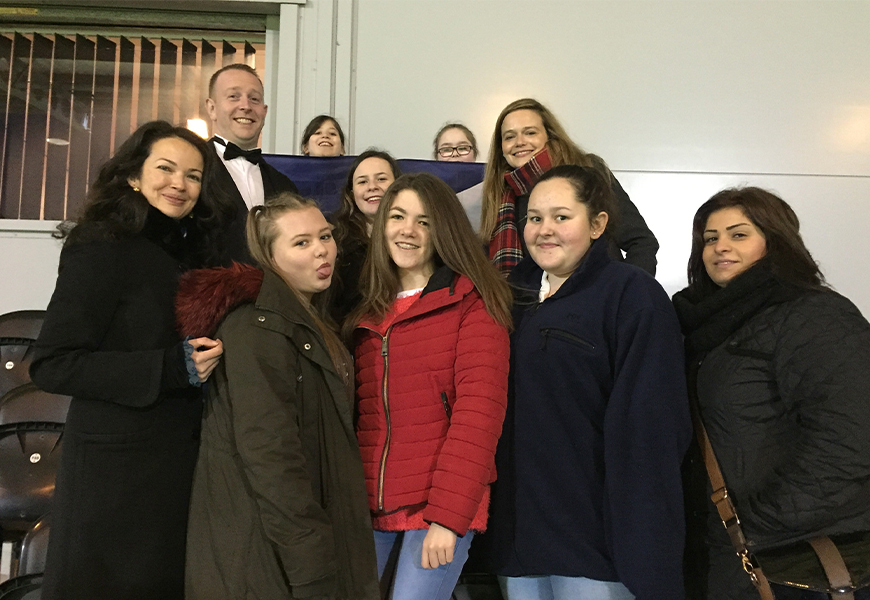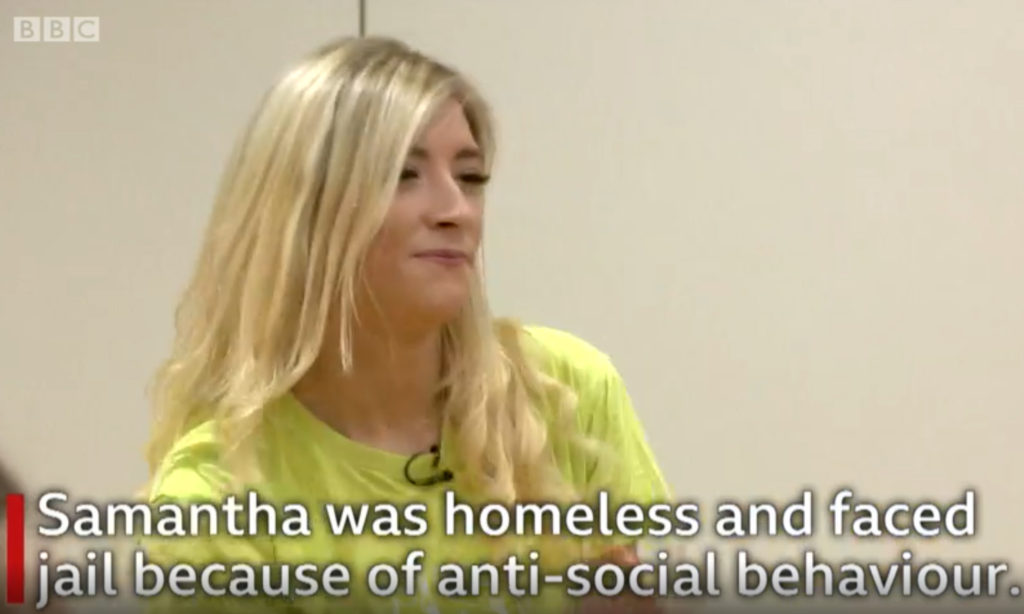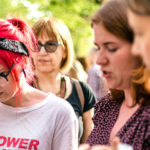Founder & Director, Glasgow Girls Club
The Glasgow Girls Club (GGC) is born from our sister organisation based in New York (NYC). In 2013 I had the opportunity to spend a year in NYC, where I was deeply moved by the work of the Lower East Side Girls Club (LESGC). LESGC is a non-profit that gives local young women a place to connect, thrive and grow.
The organisation serves a neighbourhood impacted by addiction, deprivation, crime and homelessness. Having had personal lived experience of homelessness and isolation at the age of 16, I couldn’t say no when the founder offered me the support to establish a sister Girls Club in Glasgow.
I had always been grateful and aware of the impact, of positive relationships, mentors, and networks available to me, as I navigated the challenges faced by a teenage girl in a homeless setting. I had big dreams and an ‘away from’ goal – but it was the relationships and connections that I was able to make that helped me to move beyond the barriers I faced. Needless to say, this opportunity felt like a calling for me, and a way to use my own lived experience to give something back.
Since inception in 2014 GGC has done so many fun things, both at home and in NYC. We have taken 2 groups of young women to NYC to visit our LESGC sisters. Both trips were incredible experiences – we spent 5 days at camp in the Adirondacks, we hung out in Manhattan at LESGC, and we made short films aiming to inspire self-belief and amplify the voices of young women from around the world (you can see films by CLICKING ON THE LINKS BELOW).
400 Million Girls
Pure Love Yourself
From the beginning I had a strong sense that GGC wasn’t there to act as a new service or compete with existing services, but instead to support the people using these services and connecting people to what was already out there. Given my own lived experience and ‘why’, it wasn’t a surprise that one of the areas we began to find we were able to have the most impact was within a homeless and supported accommodation setting. One inspiring example of the support we provided was with Sam.
Sam became homeless when she was 16. after low-level offending she faced being sent to prison for a longer sentence. You can ‘hear more from Sam’ by CLICKING THE PICTURE LINK BELOW
Instead, she got the offer of probation, and support through GGC.
Sam initially became involved with a GGC film project about homelessness. Sam helped with the project by giving an insightful account of her life and her experience.
The film was presented to an audience at Declaration Festival, in March 2017. This festival was a partnership between the Mental Health Foundation, the Health & Social Care Alliance Scotland (The Alliance), NHS Health Scotland, NHS Lothian, the Centre for Health Policy at the University of Strathclyde and the Scottish Recovery Network.
At the time Sam said:
“It was completely new territory but it was good fun. It was brilliant to see everything we did – it was a real sense of achievement. I’m not one for finishing a lot of things and it was good to follow through on something. I was really nervous but my confidence grew. I feel more confident now and I will hopefully continue and do more of these things. I’ve got the taste to do more. I’d love to do more stuff like that. I’d like to interview people and make connections”.
Sam could see that by using her experience she could help others. She had a passion and talent for writing and creating, and the experience of film making gave her a lot of ideas.
Sam said:
“I didn’t know what was out there and what could help me. There’s just a lot of things you don’t know about and where to go. It would help to make people more aware of what is out there and showing them a window to that.”
Sam also subsequently made another film with GGC which aimed to help other people who found themselves in a similar situation. CLICK THE LINK BELOW to watch Sam’s story.
Sam’s Story
We continued to mentor and support Sam beyond the film projects. As part of our community connector & employability efforts we supported Sam to follow her dream to become a professional dancer by introducing her to local charity ACHIEVE MORE, which runs dance and football training.This connection was pivotal for Sam as she was soon offered the opportunity of employment with Achieve More and from there enrolled with a college to study dance. Sam is now in her second year of study and well on track to reaching her dream.
Working with Sam and recognising the part we were able to play in her triumphant story was just as pivotal for GGC as it was for Sam. Sam helped us to understand the value we were organically bringing as community connectors for young women at risk of crisis, and ultimately Sam also inspired us to create our own digitally enabled social solution. To me, Sam is such a wonderful illustration of the power contained within individuals to not only change their own destinies, but also affect change in their wider communities. Sam helped to illuminate the path for us just as much as we did for her.
Inspired and propelled by this work with Sam we decided to pilot a community connector framework for young women in the North of Glasgow, providing support to those at risk of falling into, or in crisis. Half way through the pilot the pandemic hit, affecting all individuals, so we decided we could explore the options of use technology to expand our efforts to support everyone who needed it. The foundation had already been laid, and relationships built with services that support with issues such as poverty, homelessness, unemployment etc. The task was to signpost to these types of resources via a simple, easy to navigate digital tool. Because of our support and connections in the tech world we were able to expand our remit and offer a solution.
We went on to create a variety of digital community connector resources in the North of the City. We were able to deliver a digital wellbeing directory, in Hillhead and Springburn, and we also worked closely with local anchor housing association, ng homes, to design a Scotland Loves Local app promoting small businesses.
This digital work paved the way for a conversation with Community Justice Glasgow who have regularly expressed the need for an effective and accessible Community Justice focussed city wide interventions directory. Our knowledge gained from designing a digitally community connector tool aligned well into this need and allowed us to extrapolate our skills and experience into a Community Justice setting.
The Let’s Get Communities Connected App will be a digital hub, designed through the lens of the specific needs of people with lived experience of the justice system, and will also be a resource for services and referrers. As it will also be freely available to the wider community there will be benefit to organisations and communities right across Glasgow – far beyond the Community Justice landscape.
*A Note from the Editor – This work is well under way and we hope to launch early 2022. You can ‘read all about it’ in our article LET’S GET COMMUNITIES CONNECTED – UTILISING TECH FOR GOOD IN JUSTICE.
The services included in the app are based on the priorities of Community Justice, and the issues those involved in criminal justice are at risk of experiencing, such as mental health issues, homelessness, unemployment and so on. The App will link out directly to websites and social media pages, and also have the ability to call the main contact number of the organisation directly from within the App, making it an accessible platform to help people get back into their community through connecting with the support they need.
The project also aims to achieve sustainability through a Community led Steering Group, identifying local champions in each Ward area (voluntary community connectors) who will be trained by GGC to add and remove content as appropriate, providing an employability skills training pathway into Tech for those who volunteer as community connector champions.
Pathways to employment: These training opportunities will proactively support people to gain useful digital skills, build aspiration and illuminate pathways into further education, employment and / or other opportunities within third and digital sector. The programme will provide support, and open opportunities for those furthest from the labour market, and otherwise least likely to access a career in digital – young mums, people coming from a background of homelessness or having lived experience of the justice system or addictions. The training will help to provide them with the skills employers are looking for, helping them to enter the labour market and establish careers. By providing this type of preventative pathway and support towards employment we aim to help reduce offending, and antisocial behaviour – which will help to reintegrate people to become positively contributing members of our communities.
In summary, we hope that provision of an easily accessible targeted digital support hub, and our digital employability training programme can work as preventative measures to committing crime, and help people feel more involved and productive in their communities. We aim to help divert and support people who might find themselves in Sam’s position, and help break the cycle of reoffending by easing the integration process back into communities following a prison sentence. The research to populate the App is in the early stages but will be completed throughout the coming year. It will no doubt be a successful piece of work, useful to individuals who need it most, as well as a spotlight to the crucial services being delivered by Community Justice partners and organisations across the city.




